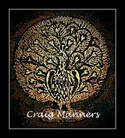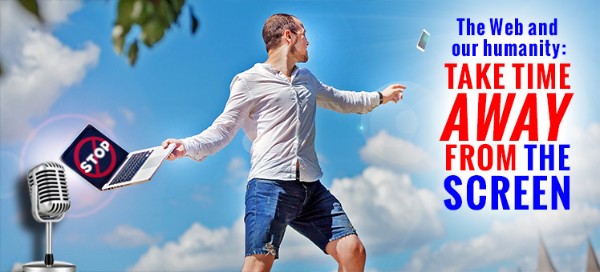|
The Web and Our Humanity - Take Time Away from the Screen
LISTEN TO TODAY'S COMMENTARY SUBSCRIBE TO BREAKPOINT DAILY By JOHN STONESTREET 5th Oct 2016 Who doesn’t love the Internet? News, entertainment, shopping, connecting with friends? But what is it doing to our souls? Back in the mid-1990s, Andrew Sullivan, the former editor of the New Republic, learned he was HIV-positive. Twenty years later, a series of health issues, including infections that wouldn’t clear up, caused him to shut down his popular and influential blog, “The Dish.” The ironic, or perhaps telling, thing was that his HIV infection had little, if anything, to do with his health troubles. What was making him sick was the Internet. Sullivan tells this story in the cover story of the September 19th issue of New York Magazine, entitled “I Used to Be a Human Being.” In it he described his version of what is sometimes called “living in the web”: “For a decade and a half, I’d been a web obsessive, publishing blog posts multiple times a day, seven days a week . . . Each morning began with a full immersion in the stream of internet consciousness and news, jumping from site to site, tweet to tweet, breaking news story to hottest take . . .” The “reward” for this obsessiveness was being among the first people to make a living and a career out of what has been called “Web 2.0.” He turned being a blogger into a being a “brand.” The price was a “never-stopping,” “always updating” way of living that was incompatible not only with being healthy, but also, as the article’s title suggests, being truly human: “Vacations,” he wrote, “such as they were, had become mere opportunities for sleep,” and “my friendships had atrophied as my time away from the web dwindled.” Finally, in January of 2015, he walked away, not only from blogging but to a large extent from the web itself. He even attended a silent retreat as a kind of detox. If running people ragged was all that “living in the web” did to us, that would be bad enough. But Sullivan, like my BreakPoint colleague Shane Morris, is even more concerned about what it does to our souls. It has, in Sullivan’s words, caused “our oldest human skills to atrophy.” Within two decades, we’ve gone from phone calls to emails, to texts, to emojis. As Sullivan writes “We remove or drastically filter all the information we might get by being with another person. We reduce them to some outlines—a Facebook “friend,” an Instagram photo, a text message—in a controlled and sequestered world that exists largely free of the sudden eruptions or encumbrances of actual human interaction.” And that’s when we aren’t being nasty to one another. In his two-part BreakPoint article (which I encourage you to read at BreakPoint.org), Shane documents how the Web’s “dis-inhibitory effect” has brought out the worst in so many people: It’s altered our concept of sexuality and human intimacy; it has virtually destroyed journalism; and—as you can see if you dare to read comments online—it has made us meaner, crazier, and more paranoid. But most of all the noise of “living in the web” keeps us from seeing and hearing what’s good for our souls. Christians, more than anyone else, should know this. Consider Paul’s exhortation in Philippians 4: “Finally, brothers and sisters, whatever is true, whatever is noble, whatever is right, whatever is pure, whatever is lovely, whatever is admirable—if anything is excellent or praiseworthy--think about such things.” Does the time spent on line help us consider these things? Jesus lived in a time that was, compared to ours, a still-life painting. And yet even then, he felt the need to regularly withdraw from the noise and distractions of his times. I doubt that any of us, starting with me, could last five minutes in the quietness of first-century Palestine. What Sullivan and Morris help us understand is that modern telecommunications technology is not “morally neutral.” It comes with a definition of what it means to be human that’s at root inhumane. The question is: how badly do we want to be human? And will we unplug to pursue It? ADD BREAKPOINT TO ITUNES NEXT STEPS The Web and Our Humanity: Take Time Away from the Screen Read Shane Morris's 2-part article, "The Case Against the Internet," linked below. Then why not take John's challenge--consider time away from the ubiquitous screens that take up so much of our time. That small step might prove extremely beneficial for your soul. RESOURCES The Case Against the Internet, Part 1 Shane Morris | BreakPoint.org | August 22, 2016 The Case Against the Internet, Part 2 Shane Morris | BreakPoint.org | August 24, 2016 I Used to Be a Human Being Andrew Sullivan | New York Magazine | September 18, 2016 Alone Together: Why We Expect More from Technology and Less from Each Other Sherry Turkle | Basic Books Publisher | October 2012 Courtesy: BreakPoint.org
0 Comments
Your comment will be posted after it is approved.
Leave a Reply. |
Craig MannersWhile much of what is written in this Blog may currently appear to be counter-cultural, given our post-truth culture, it is in no way counter-human beings. I am always for people no matter what they think, do, or may have done in their past. Where I put forward ideas or debate against certain ideology, behaviour, ideas, movements, politics, I remain very much on the side of the human beings even though I may be opposed to their worldview, behaviour and politics. Such opposition is generally out of concern for the ultimate consequences of such behaviour or ideas, especially for children. |
- Africa
- Reflections by Craig Manners
-
Articles by Craig Manners
- While We Wait by Craig Manners
- Written on our Hearts by Craig Manners
- Cure for Death by Craig Manners
- Perfect Justice, Perfect Mercy. Only God Could do This. By Craig Manners
- Authority By Craig Manners
- Creation and Providence by Craig Manners
- Forgiveness by Craig Manners
- All Things for Good by Craig Manners
- A Complete Education by Craig Manners
- Humans. Moral beings or not?
- Soviet Era Mass Conversion Therapy Mind Control Set to Control the West by Craig Manners
- On the Road to Adelong by Craig Manners >
- What is Christianity all about? >
- Note Pad
- To be Frank!
- A Cultural Revolution
- Wanted: Men who Understand the Times
- Grieved by the Grievance Virus
Contact Craig Manners
Copyright Craig Manners © 2016 to 2019

